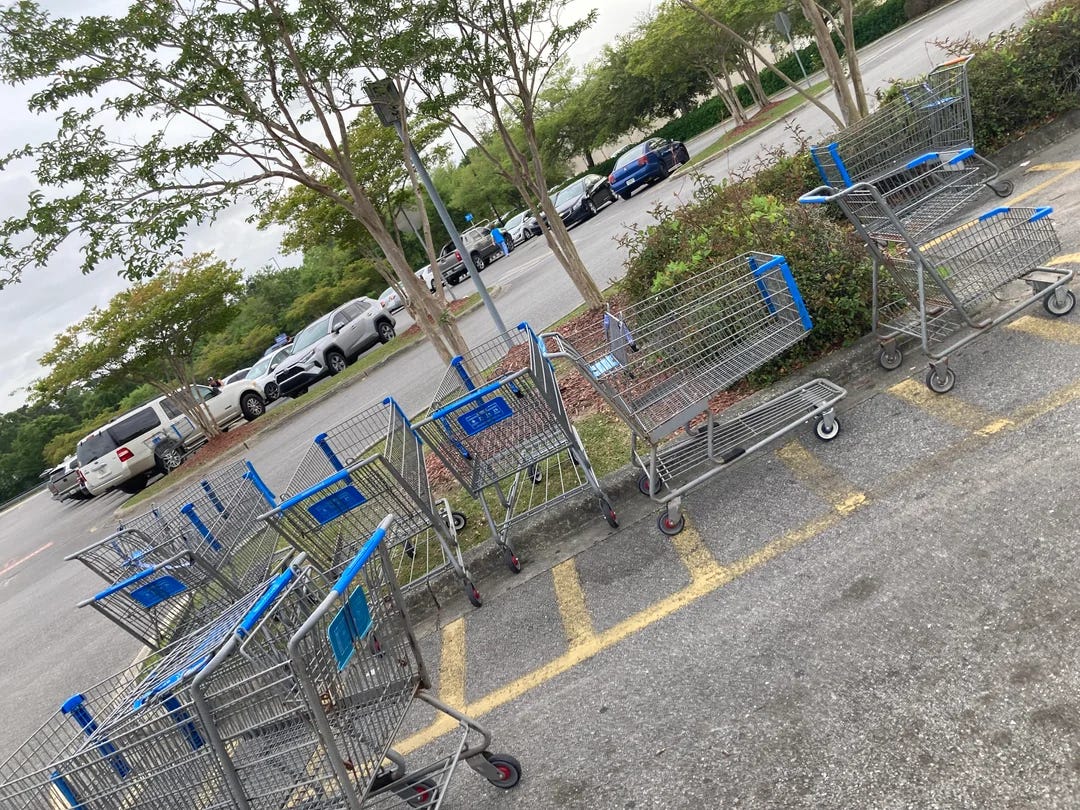What If No One Ever Returned The Cart?
The Myth of the ‘Bad Person’ and The Misguided Morality of Cart-Shamers
It’s maybe the one thing that all people on Reddit agree on.
All good people return shopping carts. People who don’t are THE WORST—a deceptively simple dilemma that, once discussed, reveals a much larger mess of modern corporate expectations and consumer responsibilities. At first glance, it’s about courtesy and convenience, but think a little wider and deeper and we’re faced with the quiet transformation of consumer spaces, where stores offload tasks previously handled by staff onto the consumer, reshaping not just the shopping experience itself but the very nature of the citizen’s relationship with corporations and government.
Or as a woman in California recently put it…
This good people return carts argument has been made many times across social and traditional media recently. Today, my friend John Demont, articulated it particularly well and passionately in the Herald. Are we going to continue to say The Herald? I know it was digitally rebranded Saltwire years ago and now with the company’s bankruptcy and sale, and few remaining employees, there’s really no connection to that traditional Halifax newspaper. I’d share the article with you here, but of course, it’s behind a paywall so the sharing of local media for the sake of community discussion is also a thing of the past. So, as not to rob them or defy copyright, you’ll just have to take my word that John, in his customary way, put a good argument that I’ll do my best to summarize.
Good People Return Carts
John DeMont reflects on how small, everyday actions—like returning a shopping cart, picking up after a dog, or being courteous in traffic—serve as indicators of one’s character. He recently observed a woman abandoning her cart in a handicapped spot and muses on how such choices reveal more about a person’s moral fiber than they might realize. Drawing on the Proust Questionnaire’s idea of introspective character evaluation, John suggests there are simpler ways to assess integrity. Noting the behavior of people in public—how they treat waitstaff, interact with strangers, or show kindness—is often a “tell” of their true nature. While some actions may signal a lack of responsibility, others—like holding doors open or letting someone merge in traffic—demonstrate everyday decency. The article concludes that, amid flawed behaviors, there are still people who embody integrity in these small but telling gestures. Then in the post-script, the Saltwire Network, whatever that is, posts a typical disclaimer, in case anyone is offended by John’s raucous rhetoric.
John’s not the only one writing about this. It’s called the Shopping Cart Theory.
The Examiner went so far as to do a long-form well-researched piece that they called THE SCIENCE BEHIND WHY PEOPLE DON’T RETURN THEIR SHOPPING CARTS that, I was surprised to read, never got up above the idea of people talking about what people should do with the carts. Surely they, of all media outlets, could have dug deeper into what’s really going on here?
But there just seems to be some attraction to picking sides and fighting people in a parking lot. And as CARTNARCS proves that means someone can make a YouTube business out of it.
A few years ago, the “Shopping Cart Theory” circulated online on places like Reddit. It claims you can determine a person’s character based on their cart habits. The theory suggests, if you return your cart you’re a good person, and if you ditch it – quite the opposite. As CTV reports from Kitchener,
“They're ignorant. They haven't been brought up by their mother right,” said Bill Maccoll, a shopper from Kitchener.
Ann Marie Gaudon, a psychotherapist, has disputed that theory. She said there’s a lot of factors that go into decision-making, including mental health or physical capabilities.
“There's just so many reasons why someone may or may not return a cart. But I would never accept that as a judgement of anyone's moral character,” she added.
Judging someone based on that, she believes, is wrong.
“It's not healthy at all to place judgment. We all are who we are at the core. We're all very capable of doing bad things and very capable of doing good things,” Gaudon explained.
I disagree. We do have to talk about this and judge. But we need to think bigger and longer before we do.
“JW, you are exhausting. Why do you have to swing at every pitch? Isn’t your sudden interest in grocery carts a bit much?”, says my friend when I start tossing around the idea of writing my second long-form grocery cart essay. “Don’t you have work to do?” She’s right. I do. But this won’t take long. My conscience won’t release me from these things so I might as well do it now. And I kind of have a horse in this race. One of my first jobs was packing and loading groceries at the Dominion Store in Bedford in the era when the red crates on the conveyor belt replaced the big parking lot grocery dollies. It’s the kind of great early job that really builds a lot of skills from effort and care to social skills and being a decent person. I loved the job and learned a lot, and I would have stayed at it a lot longer except they would not give me the shift off to go to the April Wine First Glance tour concert at the Metro Centre… a kid from Waverley has to have certain priorities, pride, and loyalties. I quit to go to the concert and don’t regret it to this day.
As I often do in trying to sort out my own critical thinking, applying Henry Hazlitt's Economics in One Lesson to the shopping cart dilemma reveals a clear case of short-sighted economics. Hazlitt argued that true economic understanding means considering the long-term effects on all groups, not just the immediate outcome or the convenience of a single group. Cart shamers focus narrowly on individuals who don’t return carts, missing the broader, systemic impact of corporate decisions that removed these entry-level jobs. In pursuit of cutting costs, corporations transferred these responsibilities onto the customer, eliminating positions that offered young or low-skilled workers an entry into the workforce. While some might view an abandoned cart as a minor inconvenience, the long-term effect has been fewer jobs and more unpaid tasks for consumers. Ironically, the shaming should be directed not at fellow shoppers but at the corporate choices that eroded this small but steady rung of employment from the economic ladder.
If you happened to be swayed by THE CARTNARCS argument about leaving carts being the same as encouraging littering in his video above, take another look. Encouraging littering to create jobs for trash collectors would deliberately manufacture a problem for the sake of employment. In contrast, the shopping cart dilemma reflects a corporate choice to cut costs by removing legitimate jobs that once served a real function, shifting that labor onto customers without pay. Unlike littering, which introduces new harm, the act of not returning carts highlights a hidden cost to consumers and society from the gradual elimination of entry-level roles that once contributed to the economy. This isn’t about creating unnecessary work; it’s about recognizing the value lost when jobs are taken away.
Am I My Brother’s (Corporate Cart) Keeper?
The shopping cart debate is a neat microcosm of the way corporations have shifted operational burdens onto customers under the guise of convenience, efficiency, or personalization. It’s not a huge leap from cart returns to the array of "self-service" aspects now considered standard. Whereas grocery stores once prioritized shopper experience—from assisting with selection to managing inventory, checking, bagging, and carry-out service—today, much of this falls squarely on the shopper’s shoulders. And it’s not limited to groceries: we’re asked to pump our own gas, book our own flights, and even track our own packages. This “consumer-as-employee” phenomenon has undeniably taken root across industries, paired with rising costs and, often, waning service quality.
After calling it an anthropological issue Scientific American put it, “We've commoditized time and labor in a variety of ways; not returning a cart may indeed force a supermarket to hire someone eventually to help if enough people demand the service” But they still return to the notion that it’s an individual’s responsibility that maybe only extenuating circumstances exempt them from and if we don’t then we’ll have to ‘pay’ for the corporations to do it.
Why Do We Give Corporations So Much Slack?
If dad left the stroller in the driveway words would be said. Yet the grocery store leaves its carts in the parking lot after not helping with anything and we blame our neighbours. It’s crazy. The issue really comes down to what some observers have called responsibilization—a corporate and governmental trend of pushing individual accountability onto the public for everything from health care to environmental stewardship. This concept, argued by scholars like Michel Foucault and Nikolas Rose, suggests that neoliberal ideologies encourage self-regulation and self-service as a means of transferring cost and labor burdens from institutions to individuals. And while it might sound liberating in theory (self-checkout is so quick!), in practice it often manifests as hidden labor—a psychological and physical workload we’re convinced to take on, ironically, for the privilege of buying something.
Barbara Ehrenreich tackled a similar theme in Nickel and Dimed, where she highlighted how society’s most grueling tasks are often offloaded onto those least capable of saying no. In many ways, we could argue that the routine burdens of shopping reflect this broader devaluation of consumer well-being.
Benjamin Barber, in Consumed: How Markets Corrupt Children, Infantilize Adults, and Swallow Citizens Whole, argued that the modern economy infantilizes consumers by treating them as perpetual novices who need constant, guided consumerism to make choices for themselves. Through this lens, it’s no surprise we’ve accepted self-service as a norm—it’s simply a part of a broader infantilization, where the public bears responsibility without meaningful power.
Let’s Take the Widest Possible View of a Seemingly Small Problem
Placing individual responsibility on consumers often mirrors the way big corporations and governments place responsibility for massive, systemic issues like climate change squarely on the shoulders of individuals. Climate-conscious consumption is a good example: despite the fact that a small number of corporations are responsible for the vast majority of emissions, campaigns often target consumers to recycle, compost, or avoid plastic straws, sidestepping the broader and much more impactful systemic changes that would be required.
The smartest observers are saying we need to look at the root of the problem rather than accepting these low-level fixes.
Here’s a counter to the cart shaming argument: it’s not about individuals failing to perform a minor civic duty, but rather about an entire consumer ecosystem where corporations have redefined the role of “customer” to mean “unpaid laborer.”
Maybe the real issue becomes more clear when the shopping carts drift off the parking lot and end up in the local park, on your street, or in your driveway and the store, whose name is literally on the side of the cart, says it’s not their problem.
Reclaiming this lost ground could mean advocating for shifts back to a more service-oriented approach, but it could also mean questioning more broadly why the costs, tasks, and inconveniences of running a store have become our individual burden.
The Consumer/Worker Revolt Has To Start With You
So next time you see that cart unreturned, consider it may be an act of silent protest, or just somebody’s Mom pushed just a little too far by Walmart. For the sake of all concerned, some of these micro-labors should still be handled by the businesses profiting from our patronage.
The next time you’re tempted to feel guilty for not hauling that cart back, remember — questioning the system that puts it on you might be the most civic-minded act of all.







